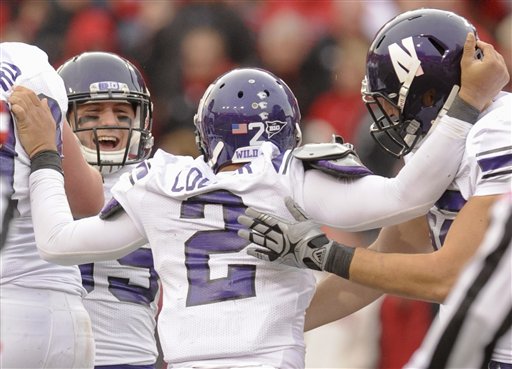Northwestern University Football Players First To File To Form A Union [UPDATE]
By Chuck Sudo in News on Jan 28, 2014 7:00PM
Update 2:15 p.m. Both Northwestern and the NCAA responded to the union filing by Northwestern's football players today. Jim Phillips, NU's vice president for Athletics and Recreation, released a statement that should be the model for all official responses.
"We love and are proud of our students. Northwestern teaches them to be leaders and independent thinkers who will make a positive impact on their communities, the nation and the world. Today's action demonstrates that they are doing so."Northwestern University always has been, and continues to be, committed to the health, safety and academic success of all of its students, including its student-athletes. The concerns regarding the long-term health impacts of playing intercollegiate sports, providing academic support and opportunities for student-athletes are being discussed currently at the national level, and we agree that they should have a prominent voice in those discussions.
"We are pleased to note that the Northwestern students involved in this effort emphasized that they are not unhappy with the University, the football program or their treatment here, but are raising the concerns because of the importance of these issues nationally.
"Northwestern believes that our student-athletes are not employees and collective bargaining is therefore not the appropriate method to address these concerns. However, we agree that the health and academic issues being raised by our student-athletes and others are important ones that deserve further consideration."
Compare that to the statement from Donald Remy, Chief Legal Officer for the NCAA.
This union-backed attempt to turn student-athletes into employees undermines the purpose of college: an education. Student-athletes are not employees, and their participation in college sports is voluntary. We stand for all student-athletes, not just those the unions want to professionalize. Many student athletes are provided scholarships and many other benefits for their participation. There is no employment relationship between the NCAA, its affiliated institutions or student-athletes. Student-athletes are not employees within any definition of the National Labor Relations Act or the Fair Labor Standards Act. We are confident the National Labor Relations Board will find in our favor, as there is no right to organize student-athletes.
An undisclosed number of Northwestern University’s football players have filed a petition to form a labor union with the National Labor Relations Board Tuesday. It’s the first time in the history of college sports that athletes are being asked to be represented by a union.
The petition was filed in Chicago by Ramogi Huma, president of the National College Players Association, with the technical backing of the United Steelworkers Union. Huma, who played college football at UCLA, said the filing “is about finally giving college athletes a seat at the table. Athletes deserve an equal voice when it comes to their physical, academic and financial protections.” Although the exact number of players who signed union cards isn’t known, at least 30 percent of the team needs to sign them in order for the filing to take place—26 of Northwestern’s 85 football players are on scholarship.
Huma told ESPN’s “Outside the Lines” NU quarterback Kain Colter reached out to the NCPA last spring for help in organizing and was spearheaded the labor effort, which culminated in a series of weekend meetings with other players. Colter, Huma and former UMass basketball player Luke Bonner also created a union called the College Athletes Players Association that would represent the players, if the petition is recognized by the NLRB.
Convincing arguments have been made in recent years to pay college athletes for their efforts on the field, court, ice and tracks. Tyson Hartnett, writing for the Huffington Post last October, equated being a college athlete to having a fulltime job with an annual salary of $25,000—the average yearly cost of a four-year scholarship.
On a typical day, a player will wake up before classes, get a lift or conditioning session in, go to class until 3 or 4 p.m., go to practice, go to mandatory study hall, and then finish homework or study for a test.--snip--
The point of this is that a scholarship doesn't equal cash in a player's pocket. Even with any type of scholarship, college athletes are typically dead broke. But how much do the top NCAA executives make? About $1 million per year.
The National Collegiate Athletic Association (NCAA) and its supporters have consistently taken the position that athletes are already being paid by attending college on full-ride scholarships. As the number of underclassmen leaving college football and basketball for professional careers has grown, the NCAA has started to re-think their stance. The subject of paying college athletes was a focal point of last week’s NCAA convention in San Diego.
United Steelworkers president Leo Gerard used to believe that before he spoke with Huma.
“(W)e were like an overwhelming part of the population in that we figured athletes were lucky because they're getting an education," Gerard said. "But then we looked into it and realized it's a myth. Many don't get a true education and their scholarships aren't guaranteed."
The NFL Players Association approved a resolution Tuesday "pledging its support to the National Collegiate Players Association (NCPA) and its pursuit of basic rights and protections for future NFLPA members.”
Colter told the Chicago Tribune the issue isn't about compensating players and anticipated a legal battle that could reach all the way to the Supreme Court.
